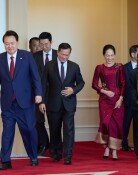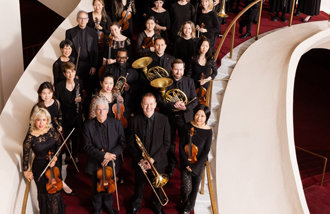N. Korea randomly applies standard of press freedom
N. Korea randomly applies standard of press freedom
Posted July. 27, 2013 07:08,
Members of the North Korean delegation abruptly jumped into the press center where South Korean reporters were staying at the inter-Korean Kaesong Industrial Park on Friday, the first incident of its kind ever. As South Korean officials were trying to block, the North Koreans said, We are free to do it, and pushed ahead with a press conference. North Korean officials commented the word freedom out of blue on their own, which sounded somewhat awkward. This remark reminded South Koreans of double standards toward freedom the North has displayed thus far.
The North raised issue with the Souths media as one of the reasons it chose to shut down the industrial complex. Pyongyang has been blasting the South Korean media, saying that the latter insulted the Norths supreme dignity by labeling the complex dollar box, cash cow, and food source. Afterwards, the North continued to make condemnations of the South, mentioning the South Korean president and ministers names. As the negotiations over the resumption of the Kaesong complex are on the verge of collapse, the North has sought to take advantage of the South Korean media that had been blasting Pyongyang, in a bid to convey its message. This illustrates that the North is interpreting freedom of press in its favor as it pleases.
The same holds true with the Norths stance on the need to prevent recurrence of the suspension of the Kaesong complex. The North side claims that even though they clarified they would guarantee prevention of recurrence in an agreement with the South, the South has postponed agreeing to it. In the draft agreement presented at the 4th round of the inter-Korean talks on the complex, the North added a provision that The South decided to not conduct any political remarks and actions and make military threat that could be detrimental to stable operation of the Kaesong Industrial Park. In other words, the provision could be interpreted as suggesting that while the North puts restrictions to the South, it will continue to retain the cause and freedom to shut down the complex in the future, a condition the South can hardly accept.
If everyone calls for unlimited freedom for themselves, no one within the community will enjoy freedom. This is called the paradox of freedom. Since the two Koreas have different political systems and ideologies, the meaning of freedom in the two sides can be different. But the paradox of freedom, which suggests that in order for people to enjoy freedom everyone should follow minimum rules, should be applicable to everywhere. If the North intents to resume the operation of the Kaesong Industrial Complex, and wants to see South and North Korean workers and entrepreneurs freely live in there, it is about time that it shed its double standards toward freedom, and accepted the paradox of freedom.







